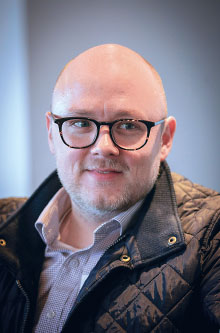APA Conference Brings Collaborative Care Model to Training Programs
Abstract
A day-and-a-half-long conference near APA headquarters was designed for residency and fellowship programs that have demonstrated a commitment to incorporating the collaborative care model into training.
“I see collaborative care as an important new way to extend psychiatric expertise to more of our young people,” said Adrienne Adams, M.D., director of the child and adolescent psychiatry fellowship at Rush Medical College in Chicago.

Adrienne Adams, M.D., director of the child psychiatry fellowship program at Rush Medical College, wants to leverage collaborative care to reach more children in need.
Adams spoke with Psychiatric News following the first day of APA’s Collaborative Care Model for Residency Education Conference last month in Washington, D.C. She was one of more than 100 educators and trainees representing 53 programs at the conference, which was focused on how to introduce the fundamentals of the collaborative care model (CoCM) into psychiatric training programs.
Adams’ comments reflected the concern expressed by faculty and trainees at the conference: the need for new models of care to improve access to quality psychiatric care. She noted that there are only 310 psychiatrists in the state of Illinois, and more than half of them are located in the Cook County area that encompasses Chicago. That translates into a dire shortage in rural areas of the state, Adams said.
The conference is a component of training in CoCM that APA is providing through the Centers for Medicare and Medicaid Services (CMS) Transforming Clinical Practice Initiative (TCPI). In 2015, APA was one of just 39 health care organizations selected by CMS to participate in TCPI as a Support and Alignment Network (SAN).
In that capacity, APA was granted $2.9 million over four years to train 3,500 psychiatrists and primary care professionals in the clinical and leadership skills needed to support primary care practices that are implementing integrated behavioral health programs. APA is conducting the training in collaboration with the AIMS (Advancing Innovative Mental Health Solutions) Center at the University of Washington. The trainings are carried out through online classes and in-person sessions at district branch and APA meetings.
Last month’s conference was for residency and fellowship programs that have demonstrated a commitment to incorporating collaborative care into their training. The day-and-a-half conference included opportunities for experiential learning as well as networking with other programs. As a follow-up to the conference, APA is offering quarterly conference calls to assist programs with incorporating collaborative care in training.
Conference faculty included Anna Ratzliff, M.D., Ph.D., director of the AIMS Center at the University of Washington and director of the Integrated Care Training Program for residents and fellows; and Hsiang Huang, M.D., instructor in psychiatry at Cambridge Health Alliance. They led the first day’s session, “Applying the Integrated Care Approach: Practical Skills for the Psychiatric Consultant.” The session covered how psychiatric consultants work with both a primary care professional and a behavioral health care manager in a primary care setting to assess patients, formulate an evidence-based treatment plan, and track patient progress over time using a patient registry.
On the second day, past APA President Anita Everett, M.D., chief medical officer at the Substance Abuse and Mental Health Services Administration, led a breakfast session on physician wellness, followed by a panel discussion that featured educators from programs that have already integrated CoCM into their training. Panelists included Shannon Kinnan, M.D., of Creighton University; Cecilia Livesey, M.D., of the University of Pennsylvania; and Mira Sein, M.D., of Stanford University School of Medicine.
Ratzliff and Huang led the session “Implementation of Resident Education in Integrated Care,” and Kristin Kroeger, chief of policy, programs, and partnerships at APA, spoke on the importance of psychiatrists advocating for new models of care.
Faculty and trainees who spoke with Psychiatric News said the conference will help to translate theory about the integration of mental health and primary care into practice.

“It’s really helpful to get a sense of how the different moving parts of the Collaborative Care Model work together,” says Donald Simpson, M.D., a child and adolescent psychiatry fellow at Rush Medical College.
“It’s really helpful to get a sense of how the different moving parts of the Collaborative Care Model work together,” said Donald Simpson, M.D., a child and adolescent psychiatry fellow at Rush Medical College. “I wanted to see how it all comes together and how I could take this back home and put it into practice. The conference will really help me do that.”
Heather Huang, M.D., director of collaborative care at the University of Wisconsin (UW), attended the conference with third-year resident Michelle Hume, M.D., Ph.D. Huang said the university first piloted its CoCM at two of its 31 primary clinics and is now rolling out the model to four other clinics.
UW will continue to expand the model throughout its primary care network and has formed a work group to look at applying the model to pediatric and obstetrical care. Additionally, UW is looking at expanding CoCM for substance use treatment and training primary care professionals in medication-assisted treatment.
Huang said she regards CoCM as a distinct psychiatric skill set. “It’s really primary care psychiatry as opposed to specialty psychiatry,” she said.
Hume noted that the conference was particularly timely in her case. Seeking post-residency employment, she had been interested in collaborating with primary care professionals before she was even aware that her university was invested in CoCM.
Citing what she called an “urgent” need to support physicians in primary care, where most mental health care is delivered, Hume said, “I think that’s where psychiatry needs to go to leverage our expertise and help more patients.”
Cory Sonnemann, D.O., a psychiatry resident at Arnot Health in Elmira, N.Y., said, “I’m from southwest Montana, where there is a severe shortage of mental health professionals. I’m going to go back there and bring these tools with me to have an impact on a larger scale.” ■
More information about CoCM training can be accessed here.



